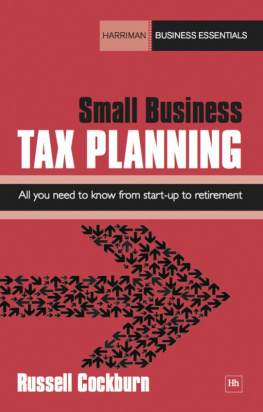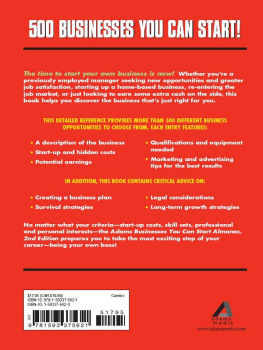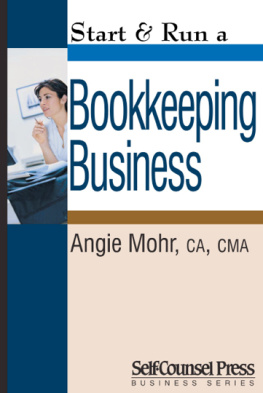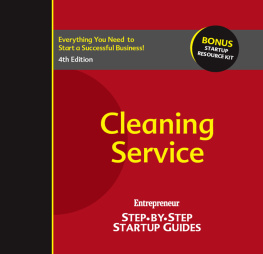Start a Business for Less Than $5,000
From Accountant to Window-Washing Service, 125+ Profitable Business Startups for Under $5,000
Richard Walsh
Adams Business, an imprint of Adams Media, a division of F+W Media, Inc.
Avon, Massachusetts
Contents
Introduction
There has never been a more exciting time to start your own business! New businesses are springing up every day all across the country. Whether these new ventures are inspired by women re-entering the job market, young people starting their careers in home-based businesses, previously employed middle managers seeking new opportunities and greater job satisfaction, or just regular folks looking to earn some extra cash on the side, more and more people are finding themselves caught up in the entrepreneurial spirit.
What has led to this entrepreneurial boom? First, there has been a sharp increase in downsizing at both large- and medium-sized businesses. In recent years, many corporations in the United States, such as IBM and General Motors, have been laying off workers in record numbers. Not only are those workers deemed unnecessary to operations laid off, but companies are also cutting full-time staff in critical functions such as accounting or payroll. These functions are then either outsourced to specialty providers, or non-benefited workers are hired to perform the tasks. Either way, companies realize a cost savings.
As companies are learning to be leaner and meaner, career-minded professionals cannot expect job security the way they could in the past. In todays economy, chances are good that the average individual entering the workforce today will not stay at one company throughout his or her professional career. And a growing number of people feel that the best way to prevent an almost inevitable layoff is to take the skills they have and open up shop for themselves.
Changes in government programs and tax benefits for minority-owned businesses provide still more clues why entrepreneurship is on the rise. Despite affirmative action programs, it is still a statistically proven fact that there is a lack of opportunity for women and minorities within medium- to large-sized companies. Thus, thousands of women and minorities are recognizing that their earning potential is much higher on their own than it would be in the corporate world, and that there is no glass ceiling to block your opportunities when you are your own boss. In addition, it is now easier for minorities and women to get financing to start new ventures, either through local banks or government programs.
The success rate is good for new minority and women-owned start-ups. According to the U.S. Census Bureaus 2007 Survey of Business Owners, women owned 7.8 million nonfarm businesses, 28.7 percent of all nonfarm businesses in the United States. This represents a 20 percent increase since 2002. And minority-owned businesses are doing particularly well, growing more than four times as fast as U.S. firms overall.
Other population groups are jumping on the entrepreneurial bandwagon as well. Burgeoning technological advances have opened up new opportunities for the physically challenged. In the past, persons with disabilities were limited in their professional choices by their physical handicaps. Affordable computers, the Internet, and greater public acceptance of home offices have opened up a wide range of opportunities for those with physical limitations, and many have launched successful ventures as a result.
The concept of the home office continues to rise in popularity. Many entrepreneurs have even been able to start new ventures while still employed at another firm, thus increasing their capital and minimizing their day-to-day financial risk. With an answering machine, a cell phone, a computer, some letterhead, and business cards, many home-based businesses can literally run themselves while you keep your day job, leaving you to fill orders or talk to clients on your off time. A few years ago, this type of business practice would not have been acceptable. But now, many new businesses are getting off the ground just this way. And if you do choose to quit your day job and work at home full-time, a high-speed Internet connection will keep you in touch with the outside world during business hours, too.
All of these cultural changes working together have created an atmosphere of opportunity in the entrepreneurial environment. The rest is up to you. Making the decision to become an entrepreneur is the hard part. All you have to do now is choose the type of business that best meets your financial, emotional, and intellectual requirements, and get going!
How to Use This Book
Youve chosen this book because youve got a certain amount of money to start a business $5,000 or less and you want to know what kind of enterprises might fit into that sort of financial framework. You can either start by looking for those particular businesses that match your skill set and available resources. Or you can simply flip through the pages at your own pace to learn more about all of the different types of businesses out there. Who knows you might just stumble onto something that addresses a lucrative skill or interest you didnt even know you had.
As you read each business description, youll notice some specific statistical information at the beginning of every entry. It is organized as follows:
- Start-up cost: These costs are calculated by adding together all equipment, advertising, and operating capital costs. We tried to consider every possible cost, and then asked the question: Whats the least amount of money you would need to start this business?
- Potential earnings: This range is based on what similar businesses are grossing. This is an average figure and does not take into account geographic variables nor costs and overhead.
- Typical fees: We researched each field to determine the average hourly rate or per-project rate. For many entries, you will see a range instead of one flat fee. This is because your geographic location may dictate the demand for your goods or services, and demand is what drives prices up.
- Advertising: Here, we rounded up all of the possible ways you could promote each type of business, from methods that cost nothing, such as networking, to long-term media contracts that cost several thousand dollars. The advertising costs are built into the start-up costs.
- Qualifications: This category contains everything you need to know about professional certifications, personality requirements, and other information pertinent to what it takes to run your business. Because licensing and certification requirements vary by location and tend to change over time, you must always check the rules with authorities in your jurisdiction.
- Equipment needed: We researched and surveyed the equipment purchases youll likely need to make to run your business effectively. You may need anything from a basic home office setup to specific industry-related machinery.
- Home business potential: Many of the businesses can be launched and run out of your own home. Weve also identified those that really need more space (such as a manufacturing facility), and those that you can run from your home even if you are not actually doing a lot of the work there.
- Staff required: A high percentage of the businesses profiled can be one-person operations, but those needing additional staff are identified, often with a suggested number of employees.












